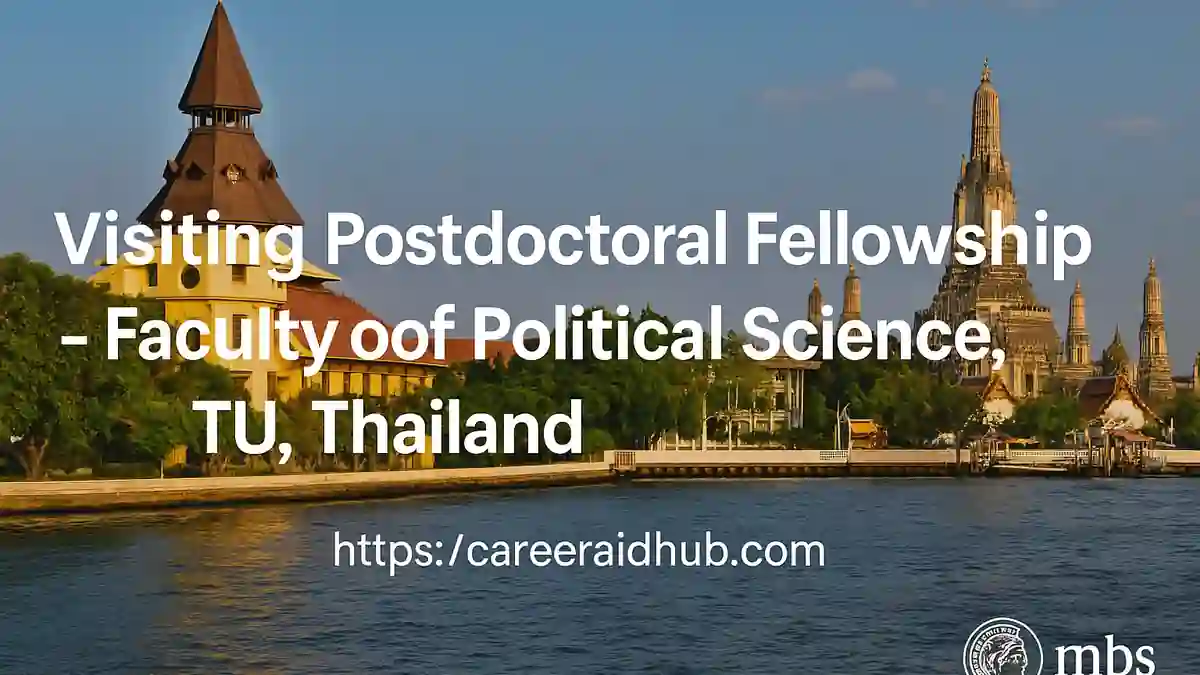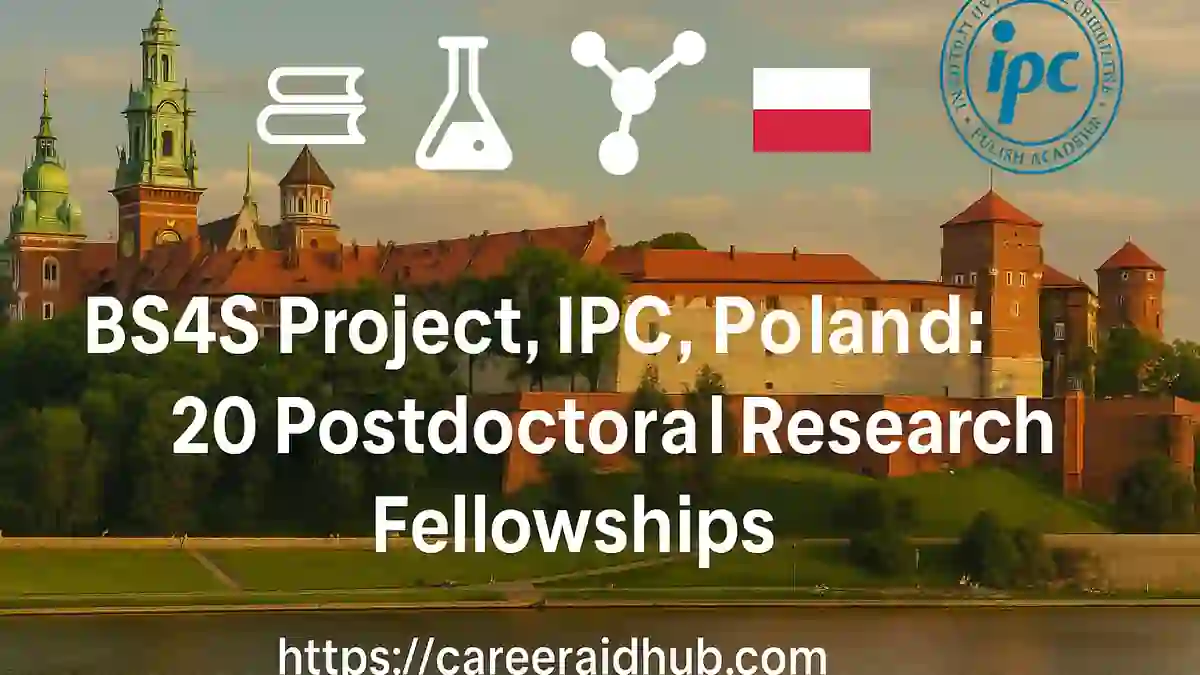Overview: A focused pathway for early-career scholars
The Faculty of Political Science at TU is accepting applications for its Visiting Postdoctoral Fellowship, with an application deadline of December 1. This visiting appointment supports scholars seeking to deepen research, extend international networks, and contribute to an active academic community through seminars, workshops, and joint outputs. Because the timeline is compact, competitive applicants plan backward from the deadline, assemble documents early, and confirm format requirements well in advance.
Ambitious early-career scholars can spend a focused term at the Faculty of Political Science, TU, refining a publishable project while building collaborations and professional skills. Prepare a clear plan, align with a faculty mentor, and submit a precise, complete dossier ahead of the deadline.
What the fellowship enables
Visiting fellows typically pursue an independent project under the guidance of a TU mentor, present work in departmental fora, and collaborate on publishable pieces or public-facing outputs. The program creates a structured yet flexible environment where a well-scoped study can move decisively from draft to submission.
Program aims and scope
The fellowship is designed to accelerate high-quality research while integrating visitors into TU’s intellectual community.
justify;">
Intellectual breadthCore strengths include comparative politics, political theory, international relations, public policy, political economy, area studies, and research methods (qualitative, quantitative, and mixed). Interdisciplinary proposals—bridging political science with economics, law, history, sociology, media studies, data science, or computational social science—are welcome when they demonstrate methodological rigor and a feasible one-term plan.
Typical fellow activities
- Advance an independent project aligned with a TU mentor’s expertise.
- Present work-in-progress in colloquia and public seminars to sharpen arguments.
- Contribute to graduate training through guest lectures, reading groups, or methods sessions.
- Co-develop outputs—articles, policy briefs, data resources, or teaching materials—with faculty and students.
Eligibility: Who should apply
The fellowship targets scholars who match the following baseline conditions and can demonstrate a credible plan for the visit.
Baseline criteria
- Doctorate awarded (or all requirements completed) in political science or a closely related discipline.
- Research record appropriate to career stage—peer-reviewed publications, advanced manuscripts, fieldwork datasets, or software.
- Feasible timeline for the proposed visit (typically one semester or short fixed term) with clear interim and final deliverables.
- Faculty fit: one or two TU mentors whose interests or methods overlap with the project.
Notes for adjacent fields
If
your PhD is in a cognate discipline, show how theoretical frameworks and methods translate directly to political science debates. Provide concrete links—common datasets, shared policy questions, or compatible identification strategies—to demonstrate immediate relevance.
Fellowship features and expected contributions
While specific terms are set by the official call, the visiting fellowship typically emphasizes mentorship, scholarly participation, and public engagement.
Mentorship and integration
Fellows receive guidance from a faculty sponsor who helps refine the design, connect with relevant centers, and facilitate seminar invitations. As you integrate into working groups and lab-style meetings, you will gain regular feedback on methods, framing, and inference.
Research participation
Visitors normally attend departmental colloquia, thematic workshops, and visiting speaker series. Participation in these forums strengthens arguments, tests robustness, and reveals collaboration pathways.
Dissemination and collaboration
The faculty encourages at least one research presentation during the visit and a public-facing component (policy brief, short methods note, or op-ed) to broaden impact. Co-authorship opportunities may arise where mutual interests converge and methodological standards align.
Selection criteria: What the committee values
Selection emphasizes research quality, feasibility, and fit.
What strong applications show
- A precise research question situated within a live literature, with a clearly stated contribution.
- A credible design for the visit window—fieldwork, archival strategy, dataset construction, causal
identification, or model development—mapped to milestones. - Methodological transparency, including data availability, pre-analysis plans where appropriate, and ethical safeguards for human subjects.
- Faculty alignment, naming one or two TU scholars and articulating reciprocal benefits.
- Potential for durable collaboration, such as co-authored papers, grant proposals, or data resources.
Funding, logistics, and support (what varies by call)
Financial details and the length of stay are defined by the official announcement. Nonetheless, many visiting programs provide:
Typical forms of support
- A monthly stipend or equivalent support for the visit period.
- Workspace, library access, and institutional software; sometimes seed funds for a workshop or limited data collection.
- Administrative assistance for residency documents where applicable.
Practical planning
If visas or research permits are required, start documentation promptly. Build a budget that includes travel, housing, and research expenses, and confirm which items are eligible for reimbursement. Finally, track reporting requirements—presentations, short memos, or end-of-visit summaries—so submissions remain on schedule.
Application checklist (submit by December 1)
Prepare a concise, verifiable dossier. Unless specified otherwise, combine documents into clearly named PDFs.
Required documents
- Cover letter (≤1 page)
State your thematic area, project title, preferred dates, and proposed
mentor/group. Keep the tone direct and concrete. - Research statement (2–3 pages)
- Question and contribution: Specify the gap and its significance.
- Design and methods: Data sources, measurement, identification, or theoretical framework; note key diagnostics.
- Work plan: Month-by-month tasks, milestones, and interim outputs.
- Anticipated outputs: Target journals, policy venues, or public repositories.
- Curriculum vitae
Include publications (accepted, forthcoming, submitted), datasets, software, public scholarship, teaching, and awards. - Writing sample (one item)
Provide an article, dissertation chapter, or working paper that best represents your approach and craft. - Letters of recommendation (if requested)
Typically one to two letters. Follow naming and upload instructions precisely. - Supporting materials (if relevant)
- IRB/ethics approval for human subjects.
- Fieldwork schedule and local permissions.
- Data management plan covering storage, sharing, and confidentiality.
File hygiene
Use descriptive filenames such as Surname_TUVisitingPostdoc_ResearchStatement.pdf. Respect file-size limits and include your name and email in headers or footers to prevent misattribution.
How to write a compelling proposal
Excellent proposals balance ambition with realism and align intellectual promises to the time available.
Practical drafting tips
- Lead with the claim, then explain how the design tests it.
- Document data provenance and quality checks: sampling frames, missingness, coding protocols, and robustness diagnostics.
- Plan contingencies: specify alternatives if an archive is inaccessible or response rates lag.
- Time-box outputs: target one figure and one table you can plausibly deliver during the visit.
- Link scholarship and public value without overclaiming; identify relevant stakeholders and appropriate venues.
Timeline and review rhythm
To avoid bottlenecks near December 1, use a backward plan that builds in generous buffers.
Suggested schedule
- Six weeks out: Confirm mentor alignment; circulate a two-page memo for quick feedback.
- One month out: Finalize the research statement; request letters and confirm ethics approvals.
- Two weeks out: Proofread, harmonize references, and verify file sizes.
- One week out: Submit and confirm receipt; archive all PDFs locally with version numbers.
If revisions become necessary post-submission, follow the call’s instructions. Some programs accept minor corrections within a short window; others cannot accommodate changes.
After you apply: what to expect
Shortlisted candidates may be invited to a virtual interview focusing on design, feasibility, and fit.
Preparation pointers
- Be ready to discuss measurement choices, identification strategies, and anticipated pitfalls.
- Outline realistic outputs for the visit and a publication pathway beyond it.
- Identify specific collaboration opportunities with TU centers or faculty.
A short slide deck with one figure or table often clarifies scope and signals preparation.
Professional development and community engagement
Visiting fellows contribute meaningfully to the faculty’s research culture.
Ways to engage
- Lead a methods mini-workshop or a themed reading group aligned with your project.
- Offer a public talk or practitioner roundtable when your topic intersects with policy debates.
- Schedule mentorship coffees with graduate students who share methodological interests.
These activities increase visibility, strengthen your network, and demonstrate service to the host community.
Final advice: act early, aim for clarity
This fellowship rewards proposals that match TU’s expertise, respect submission rules, and demonstrate deliverables feasible within the term. Start by identifying a mentor, drafting a clear, time-bound plan, and assembling a meticulous dossier with verifiable evidence. If you are ready to accelerate your research and build durable collaborations, submit your completed application by December 1 via the official channel.
Quick facts
- Program: Visiting Postdoctoral Fellowship — Faculty of Political Science, TU
- Focus areas: Comparative politics; political theory; international relations; public policy; political economy; methods
- Eligibility: PhD awarded (or all requirements met) by start date
- Application materials: Cover letter; research statement; CV; writing sample; references (as required)
- Deadline: December — we will update soon
- Next cycle (indicative): November–December — we will update soon
- Mentor alignment: Identify one or two faculty members with overlapping topics or methods
- Submission: Official portal as specified in the call; PDFs with clear filenames
Feature Table
Feature | Details |
Program Name | Visiting Postdoctoral Fellowship — Faculty of Political Science, TU |
Host Country | Thailand / Southeast Asia |
Funded By | Faculty of Political Science, TU |
Duration | One term (visit length as defined in the official call) |
Study Mode | Full-time, in-person residency |
Eligibility | PhD in political science or cognate field; strong research record; feasible one-term plan; faculty fit |
Financial Support | Stipend and institutional access; possible limited event or research support (as specified in call) |
Fields of Study | Comparative politics, political theory, IR, public policy, political economy, area studies, research methods |
Deadline | December — we will update soon |
Official Website | Click here |
Frequently Asked Questions (FAQs)
What is the Visiting Postdoctoral Fellowship at TU?It is a short-term, mentored research appointment that supports independent projects, seminar participation, and collaborative outputs within the Faculty of Political Science.
Who is eligible to apply for the TU visiting postdoc?Applicants should hold a PhD—or have completed all requirements—in political science or a closely related field, with a feasible project and strong research record.
What is the application deadline for the TU visiting postdoc?Submit by December 1 as stated in the current call. However, always verify the live notice and follow all file-format instructions.
How long does the visiting postdoctoral fellowship typically last?It usually spans one academic term or a short fixed period, although exact duration depends on the official call and faculty availability.
What documents must I include in the TU visiting postdoc application?Prepare a cover letter, research statement, CV, writing sample, and, if requested, recommendation letters. Additionally, include ethics approvals and data plans when relevant.
How should I choose a faculty mentor at TU?Review faculty profiles, align your methods and topic with their expertise, and then articulate clear collaboration benefits in your application materials.
Does the TU visiting postdoc provide funding or a stipend?Funding terms vary by call. Therefore, check the current announcement for stipend, workspace access, research support, and any allowable travel or event funds.
What selection criteria does the committee prioritize?They look for research quality, fit with faculty expertise, project feasibility, methodological transparency, and credible deliverables within the appointment period.
Can interdisciplinary projects apply to the TU visiting postdoc?Yes. Moreover, proposals bridging political science with economics, law, history, sociology, or computational methods are encouraged when they show rigor and realistic timelines.
What happens after submission to the TU visiting postdoc?Shortlisted candidates may interview virtually. Typically, you discuss design, feasibility, ethics, expected outputs, and collaboration opportunities with faculty and centers.





